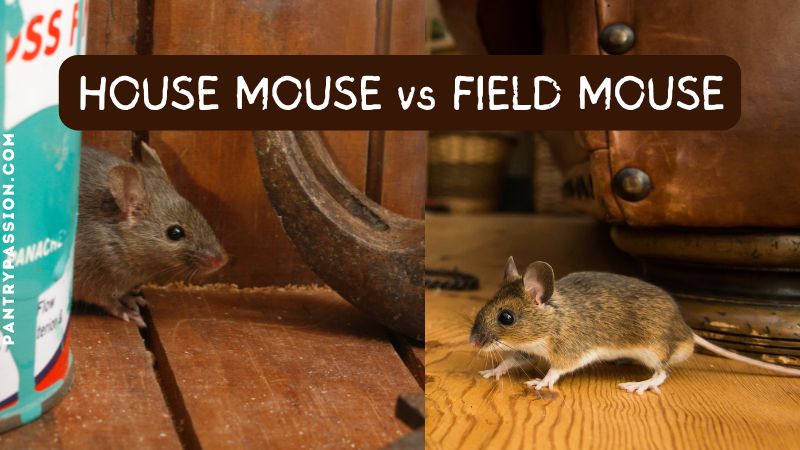The Best Fluffy Pancakes recipe you will fall in love with. Full of tips and tricks to help you make the best pancakes.

Is a fear of mice and rats irrational? Feeling freaked out when you see a mouse scurry across a counter or floor is disturbing – but a natural human reaction.
The tipping point is extreme physical reactions and avoidance. It’s no good telling a friend “a mouse is more scared of you than you are of it.” Nope, the fear is real, and it won’t go away until you face it.
This article dives into what Musophobia is and real solutions (including do-it-yourself) to overcome the fear of mice and rats.
DON’T MISS Pantry Passion’s Complete Article List for Mouse & Rat Prevention!
Table of Contents
- Everyday Fear of Mice vs Irrational Reaction
- Phobia of Mice: The Emotional Effects
- Musophobia: It’s Real
- Culture and Conditioning
- Cognitive Approaches to Get Over the Fear of Mice
- Alternative Treatments for Fear of Mice Phobias
- Fear of Mice in an Apartment: One Woman’s Experience
- What if I’m Scared to Touch a Mouse?
Everyday Fear of Mice vs Irrational Reaction
I get it, there is a huge “Ick!” factor dealing with mice and rats. For most of us, it’s not something we deal with everyday. Like changing a baby’s diaper, some of us just get grossed out. Honestly, writing this in-depth series of articles on mice and rats has really made me paranoid!
Most people are startled when they see mice – it’s a normal reaction. In YouTube prank videos using motorized mice to shock people, a whopping 98% of folks jump and scream – very normal.

Growing up in an old farmhouse, I heard the mice at night when everything become deathly quiet – it was unnerving. I could hear the mice scratching in the walls. These were the old plaster walls that were like iron. Strangely enough, I felt that it was a barrier that kept them away from me – but I still didn’t like those sounds! I also felt they were quite busy and didn’t have the time to deal with me 🙂
Seeing a rodent or disposing of a dead one is an experience that many of us would rather avoid. So what is the tipping point into full blown phobia: Musophobia, the fear of mice and rats?
Phobia of Mice: The Emotional Effects
In no way am I down-playing the mental trauma of living through a mouse or rat infestation. Let’s admit it, the playing field has changed compared to one or two mice. But if you previously lived in a mouse-free zone, seeing one can shatter the confidence that you’re safe in your own home.
Many people lived in a spotless house in childhood, or their parents were on top of mouse-proofing. Congratulations – you grew up without a care in the world. Fast forward to staying over at a friend’s or relative’s house, and suddenly life is different. You might witness a brazen mouse on a windowsill staring at you, or a rat running without fear. Your world is now changed forever.
Knowing mice are with you in your own home is scary! *virtual hugs and handholding*

Be Brave – This Could Take Some Time
The period of catching and trapping mice can take an emotional toll. Even the sounds of a snapping trap can elicit a panic attack.
Living alone and dealing with mice can be mentally taxing. There is strength in numbers knowing other people are physically in the house with you. You might want to ask a friend to stay over or stay at a hotel to get through the worst of it.
If having a friend, neighbor, or professional exterminator deal with it is the best option, then do what you have to do.
There are stories where the mouse hunt extended over weeks before the rodent was finally caught. In such cases, consider elevating your mouse catching game. If sticky glue traps turns you off, you might have to overcome your disdain for them – because for some elusive mice, it’s the only way to get them.
You might have to actually attract mice to get them. That sounds awful, but true. One owner finally used a combination of black Tomcat traps + Tomcat brand mouse attractant gel. Again, only use attractants as a last option, and then remove from your house (seriously, you don’t want to keep attracting ’em!).
Musophobia: It’s Real
The fear of mice—known as musophobia—is one of the most common animal phobias. And while it might seem irrational, it’s deeply rooted in our biology, culture, and personal experiences.
The fear of rats is also commonly called musophobia —a term derived from the Greek word mus meaning “mouse.” But interestingly, it also applies to rats, since the phobia encompasses both rodents.
So the name for the fear of mice and rats shares the same phobia name, which makes sense because they are from the rodent family.

Symptoms of Musophobia
Musophobia isn’t just about being startled. It’s a specific phobia, often linked to anxiety disorders. People with musophobia experience:
- Intense fear or disgust at the sight or thought of mice.
- Physical symptoms like sweating, rapid heartbeat, or nausea.
- Avoidance behavior, such as refusing to enter basements or old buildings.
- Nightmares about rats or mice that are so bad you may wake up panting, and then checking the room for mice.
- Inability to look at pictures or videos of mice or rats because it’s enough to trigger a severe panic.
- Inability to be in the same dwelling where mice are, or to avoid floors of a house.
- Inclination to sleep with all the lights and TV/radios on.
- Mental exhaustion of “always on” – the paranoia of anticipated mouse encounters.
- OCD levels of cleaning.
Where Does Musophobia Come From?
The fear of mice often begins in childhood, sometimes triggered by a traumatic experience or learned from parents who react strongly to rodents. Our evolutionary instincts also drive a natural fear of avoiding the diseases that rodents carry.
Musophobia is not a fear that we’re born with. Some people report it gets worse with age. Personally, I think as young adults we are sheltered from the realty of mice. When we really do have to encounter mice (and put our “big girl” or “big boy” pants on) and deal with it… our imaginations start to run away.
Ever hear the comment “if you see one mouse there are a dozen more you don’t see”? Some people really ruminate on that fact (to the point of paralysis). For everyday fear, taking back your life means taking control of your kingdom. Consider setting your own traps, it’s very empowering.
There are cognitive approaches that exists to overcome fear of mice phobias, but taking charge to keep mice out is a very effective tool that brings peace of mind.
Culture and Conditioning
From horror movies to viral videos, mice are often portrayed as pests or villains. This cultural reinforcement shapes our perception:
- Media exaggerates their threat (Mouse Hunt and Willard movies) or the recent infatuation with hoarders (their environments create habitat for rodents).
- Social learning teaches us to fear them—especially if we see others react with panic
- Gender stereotypes have long depicted women as especially fearful of mice, a trope that persists in pop culture
Even folklore plays a role—elephants supposedly fear mice, and saints like St. Gertrude of Nivelles are invoked to ward off rodents.

Are Women More Afraid of Mice Than Men Are?
The fear of mice is a completely equal opportunity for both genders. Historically, women may have appeared more fearful when long skirts were in fashion. Mice could run up between the layers of skirts and petticoats more easily than what the men had going on for trousers.
Combine that with the tight-fitting corsets that caused continuous fainting, women were naturally seen as wimps. There are plenty of men who experience the debilitating effects of Musophobia.
Cognitive Approaches to Get Over the Fear of Mice
Like any phobia, Musophobia can be treated with:
- Cognitive Behavioral Therapy (CBT) to reframe irrational thoughts
- Systematic desensitization or Exposure Therapy gradually exposing someone to mice in a controlled way
- Hypnotherapy or positive association techniques to reduce anxiety
Understanding the roots of your fear is the first step toward overcoming it.
More on Exposure Therapy
Kathryn (“Kat”) Boger, PhD, ABPP and Exposure Therapist relays her fear of mice story and how she implemented exposure therapy on her own:
“I started by looking at pictures of mice. Next I watched videos of mice, and there are some gnarly ones out there! Gradually, I worked up the courage to do pet store exposures. At first, I would just watch the cage. Seeing mice running around and climbing all over one another initially made me feel nauseous. Once I started to feel more comfortable and confident, I got to the stage of holding a real mouse.“

Although Kathryn was bit in the handling of the mouse, “it brought me to my worst-case scenario fear, and my brain learned that I could handle it.”
Although you can do Exposure Therapy on your own, there is benefit to talking to a therapist to help process the exposure experience.
DIY Exposure Therapy
For those of you who don’t have full-blow Musophobia, here are simple things to regain some sanity:
- Learn how to mouse-proof and don’t rely on others – take a deep breath, it can seem like an impossible task in older homes, but it can be done!
- Stay at a hotel or with a friend until the rodent issue is under control.
- Setup a temporary toilet station if you fear using the bathroom at night.
- Get a mini-education and walk around with the pest control service – they can point out what entry points look like.
- Vent on online forums like Reddit where you can pour out your feelings without shame.
Ultimately, you need to regain your mental health… It’s really the unknown and lack of control that is causing the anxiety. The mouse proofing will help you feel like you’re taking back control of your space.
Reddit Member FlowerrPower24
Alternative Treatments for Fear of Mice Phobias
DISCLAIMER: I am not a health care professional, nor do I endorse the methods below. It is simply provided as a basis for discussion.
Amazing results are being achieved by veterans with PTSD and victims of trauma, or persons suffering from depression, traumatic brain injury, and addiction taking the drug ibogaine. This drug is for the most part, illegal in the United Sates to use. However, states are starting inquiries into legalizing it.
From a congressman’s exploratory visit at a Tijuana clinic: “His six-week program involves four weeks of preparation in the U.S., patients taper off mental health medications, stop using drugs and alcohol, and receive health screenings, followed by a long weekend in Mexico. There, patients take ibogaine, an African root extract, and 5-MeO-DMT, derived from desert toads, which are both unregulated in Mexico but classified as controlled substances by the Drug Enforcement Administration here [US]. The program is capped off with two weeks of coaching calls to help integrate veterans back into their day-to-day lives.
Obviously, this drug/coaching treatment is for extreme situations. However, the US is paying attention to the results. Who knows? The treatment could become common place in the US in the future.
Fear of Mice in an Apartment: One Woman’s Experience
Reddit member FlowerPowerr24 had a deep fear of mice in her apartment. The thread went from the feeling of hopelessness to empowerment. FlowerPowerr24 was kind enough to return to the thread to add how she overcame her fear of mice: she took control.
Instead of just cleaning up mouse droppings, FlowerPowerr24 went into full-blown mouse-proofing followed with routine re-checking. THAT is the right way to respond. She turned into an advocate of best practices for what tenants can do for pest management. It’s true, sometimes landlords don’t listen, or a pest control company’s methods fall short.
Another member added the advice to ask your neighbors if they are also seeing an increase in mouse problems. Having another person to relate to can be mentally helpful, but also a source of support when confronting the landlord.
Yes it’s their [the landlord’s] job to take care of this but it’s a job [mouse-proofing] you can totally do yourself and is worth the energy and $15 in supplies… for the peace of mind to know you secured your place.
Reddit Member FlowerPowerr24
What About Higher Stories of Apartment Buildings?
This is the type of question a person who suffers from Musophobia asks. Moving to a higher story to avoid mice in an apartment building might make them feel safer. Are there less mice on the higher floors? Yes and No.
Visit my article on “Can Mice Climb?” to get the full answer.
Is it the Landlord’s Responsiblity to Get Rid of Mice?
There is a difference between fighting mice in your home, and mice in an apartment. Those of you living in an apartment may feel hopeless because you can’t do anything since you don’t own the property. Some people may wonder if mice are the landlord’s responsibility.
Landlords are generally responsible for controlling pests. They have a legal duty to provide a safe and habitable living environment, but tenants are also responsible for notifying the landlord of infestations and maintaining cleanliness to avoid causing them. Your specific responsibilities depend on local landlord-tenant laws and your lease agreement, but the landlord is typically obligated to handle serious issues like widespread infestations, while tenants are expected to keep their living space clean and free of food sources that attract pests.
If you live in an apartment, call management immediately, and make sure they follow through with appropriate pest control.
What if I’m Scared to Touch a Mouse?
So many people I know are scared to touch a mouse. When I came across “emergency conditioning” I just had to share it with you. Diane Vuković shared this advice and a link to the details from Primal Survivor:
“Mentally prepare yourself for having to pick up a dead mouse (obviously with gloves on). You can do this by looking at pictures of dead mice, imagining picking it up, and going over the steps in detail in your head. Then, when you have to actually do it, it won’t be as terrible. It’s called “Emergency Conditioning” and is a great thing to do for all of life’s challenges.“
Final Thoughts
Despite their size, mice hold a powerful place in our psyche. Whether it’s evolutionary instinct, cultural conditioning, or personal trauma, the fear of mice is real—and valid. It’s a fear that doesn’t have to control you – and you shouldn’t have to fear living in your own home.











